New Delhi: The Supreme Court on Monday agreed to examine the plea of the National Commission For Protection of Child Rights (NCPCR) against Punjab and Haryana High Court order which stated a Muslim girl who is 16-years-old is competent to enter into a contract of marriage with a person of her choice under the Muslim Personal Law.
A bench headed by Justice Sanjay Kishan Kaun said it will examine the issue and appointed senior advocate Rajshekhar Rao as amicus curiae to assist the court in the matter. The bench also issued notice to the Punjab government and others on the plea filed by NCPCR.
“There is a question of law that requires to be considered,” the bench said while posting the matter for hearing on November 7.
Solicitor General Tushar Mehta appearing for NCPCR contended that the Commission is not against the protection order granted to the girl but asked can the court pass orders against the penal provisions.
The High Court in June in its order had cited the provisions of the Muslim Personal Law on marriage for ruling that a 16-year-old Muslim girl was competent to enter into a contract of marriage with a person of her choice.
The NCPCR sought to ensure the proper implementation of statutory laws that are specifically in place to protect children below the age of 18 years.
The Commission highlighted the provisions of the Prohibition of Child Marriage Act (PCMA) 2006 and the Protection of Children from Sexual Offences Act (POCSO) to put forth its reasons for challenging the High Court ruling.
NCPCR order is violative of PCMA which, the petition said, is a secular law that is applicable to all.
It further said that the provisions of POCSO say no child under 18 years can give valid consent.
The High Court order had come on a plea by a Pathankot-based Muslim couple that had approached the court seeking protection after allegedly being threatened by their families for marrying without their permission.
The girl and a 21-year-old man had said that they got married as per Muslim rites and ceremonies.
The High Court had granted protection to the Muslim couple noting that the law is clear that the Muslim Personal Law governs the marriage of a Muslim girl. (ANI)




















Comments